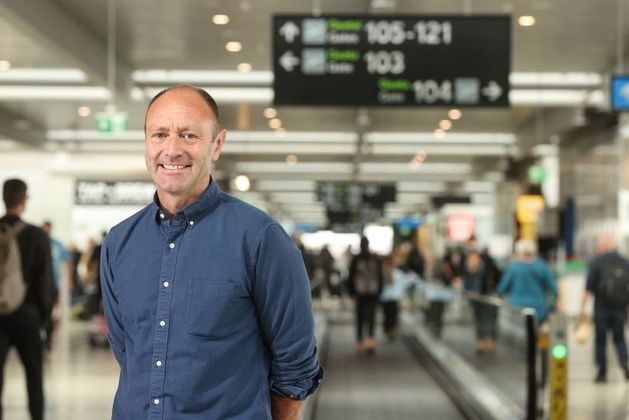Bussiness
Dublin Airport warns of air fare hikes this winter as it seeks to have passenger cap removed

DAA boss Kenny Jacobs will tell transport committee the controversial cap is ‘blunt and out of date’
DAA chief executive Kenny Jacobs will appear before the Joint Oireachtas Committee on Transport. Photo: Gerry Mooney
DAA chief executive Kenny Jacobs will today tell politicians the company intends to submit a planning application this autumn to remove the controversial passenger cap at Dublin Airport.
Mr Jacobs will appear before the Joint Oireachtas Committee on Transport where he will be questioned on the passenger cap at the airport, as well as issues surrounding car parking and other matters. He will also tell committee members that air fares are expected to rise at Dublin Airport this winter due to the passenger cap, which will restrict seat capacity although demand is high at Christmas.
Mr Jacobs will also warn that the gateway remains in danger of breaching its 32 million annual passenger cap this year despite its best efforts to ensure it doesn’t happen.
“The 32 million cap at Dublin Airport is a major concern,” Mr Jacobs will tell the committee.
“The cap is a planning condition and we have been doing everything within our power to comply with planning but we have to remember it is a condition linked to cars coming to and from the airport, and even if all 32 million passengers travelled by bicycle or bus, the cap would still remain, which shows it is blunt and out of date.”
It’s believed that Mr Jacobs will confirm to the committee that the DAA will submit a planning application this autumn to remove the passenger cap entirely. That application will be submitted pending the outcome of a decision expected in coming weeks from An Bord Pleanála on a so-called relevant action.
If that relevant action application is approved as is, it would remove the numerical cap on the average number of flights permitted at Dublin Airport between 11pm and 7am. That cap came into effect when Dublin Airport’s new runway opened. It would be replaced with an annual night-time noise quota, effective between 11.30pm and 6am.
If the relevant action is sanctioned, it’s believed Mr Jacobs will tell the committee that the DAA will then submit its operational application to remove the passenger cap.
The passenger cap at Dublin Airport was introduced in 2007 as a planning condition attached to the construction of Terminal 2.
The DAA has already sought permission in a planning application made late last year to raise the passenger cap to 40 million a year. But a decision on that process isn’t expected for a couple of years. It’s hoped a ruling on the separate planning application likely to be submitted this autumn – which will be to solely remove the cap – will be made more quickly. If its capital investment planning application is eventually approved, it’s expected the DAA will almost immediately seek a further definitive planning ruling to confirm the removal of the passenger cap.
“I’ve heard it said that DAA should have moved quicker to lift the cap at Dublin Airport – I can’t disagree and wish we could have done so earlier,” Mr Jacobs will tell the committee today.










